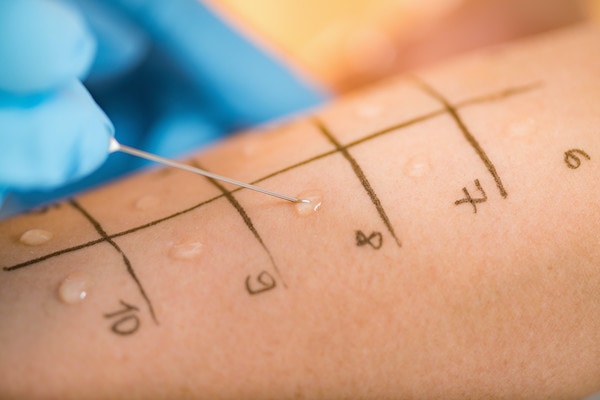USP Pistachio Protein Detection in Food
The United States Pharmacopeia (USP) 1 Chapter aims to ensure that food products labeled as "pistachio-free" do not contain detectable levels of pistachio protein. This is particularly important for consumers with peanut allergies, as cross-contamination between peanuts and pistachios can be life-threatening. This service focuses on detecting the presence of pistachio proteins in various food samples to ensure compliance with USP requirements.
The detection process involves several critical steps. Initially, the sample is prepared by extracting potential protein residues using appropriate solvents, followed by purification and concentration if necessary. The purified extract undergoes further processing utilizing advanced mass spectrometry techniques such as Liquid Chromatography-Tandem Mass Spectrometry (LC-MS/MS). These methods are highly sensitive and specific, capable of identifying even trace amounts of pistachio proteins within complex food matrices.
The primary goal is to achieve a minimum detection limit of 20 ppm of total protein from pistachios. This stringent requirement underscores the importance of accurate sample preparation and robust analytical protocols to minimize false positives or negatives. Compliance with this standard ensures not only regulatory adherence but also enhances consumer safety by reducing risks associated with accidental ingestion.
For quality managers, compliance officers, R&D engineers, and procurement teams responsible for ensuring product integrity, reliable allergen testing is essential. By leveraging state-of-the-art equipment and experienced personnel, we provide accurate results that support informed decision-making throughout the supply chain process.
Why It Matters
Accurate detection of pistachio proteins in food products is crucial for several reasons. Firstly, it protects individuals with severe allergies from potential life-threatening reactions. Secondly, compliance with USP helps manufacturers maintain their reputation and trust among consumers who rely on allergen-free products. Additionally, adherence to these standards reduces the risk of legal actions due to non-compliance or product liability issues.
The impact extends beyond just human health; it also affects brand reputation and market share. Consumers increasingly demand transparency regarding ingredient sources and manufacturing processes. By demonstrating commitment to stringent quality control measures like those outlined in USP , companies can build stronger relationships with their customers and stakeholders.
Furthermore, ensuring compliance with such regulations fosters a safer environment across industries that deal with allergens. It sets a benchmark for industry standards, encouraging other firms within the sector to adopt similar practices.
Eurolab Advantages
At Eurolab, our expertise lies in providing comprehensive solutions tailored specifically towards meeting stringent regulatory requirements like USP . Our team comprises highly qualified professionals who bring extensive experience and knowledge to every project. We employ cutting-edge technology combined with rigorous quality assurance procedures to deliver reliable results consistently.
We offer several key advantages over competitors:
- State-of-the-art facilities: Equipped with the latest instrumentation, including LC-MS/MS systems, our laboratories ensure precise measurement and analysis of pistachio protein levels.
- Experienced personnel: Our scientists possess deep expertise in both analytical chemistry and food science, enabling them to interpret complex data accurately.
- Comprehensive reporting: Detailed reports accompany all test results, providing insights beyond mere quantification. This includes recommendations for improvement based on findings, which can be invaluable for ongoing product development efforts.
- Timely delivery: Understanding the importance of prompt turnaround times in this field, Eurolab strives to process samples efficiently without compromising accuracy or reliability.
Our commitment to excellence ensures that clients receive not only reliable testing but also strategic guidance that helps them stay ahead of industry trends and regulatory changes.
International Acceptance and Recognition
The USP standard for pistachio protein detection enjoys widespread acceptance globally. Many countries have adopted similar guidelines or are in the process of aligning their regulations with those set forth by organizations like the USP.
In Europe, for instance, Directive 2002/46/EC on allergens requires food businesses to declare the presence or absence of certain major allergens (including peanuts and tree nuts) on labels. While this directive does not specify a particular method for detection, it aligns closely with the principles established by USP , emphasizing accuracy and reliability.
Other regions such as Asia-Pacific countries often look to international standards like those provided by the United States Pharmacopeia when establishing local regulations. This ensures consistency across borders while maintaining high standards of safety and efficacy.
The recognition given to USP reflects its role in fostering trust between producers, distributors, retailers, and consumers worldwide. By adhering to these guidelines, businesses demonstrate their dedication to producing safe, reliable products that meet global expectations.





